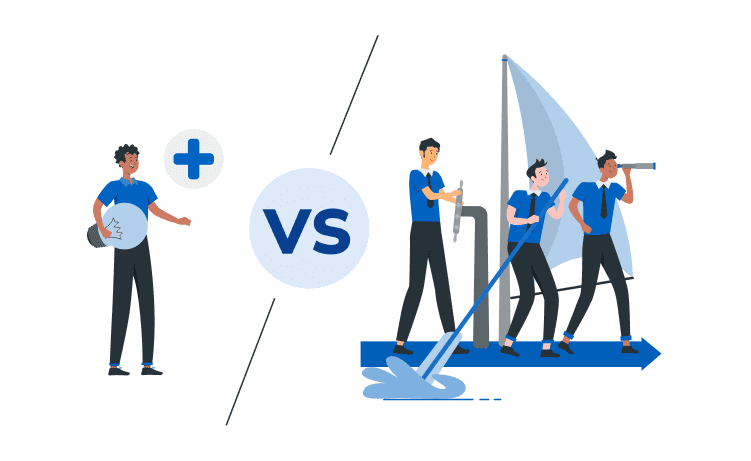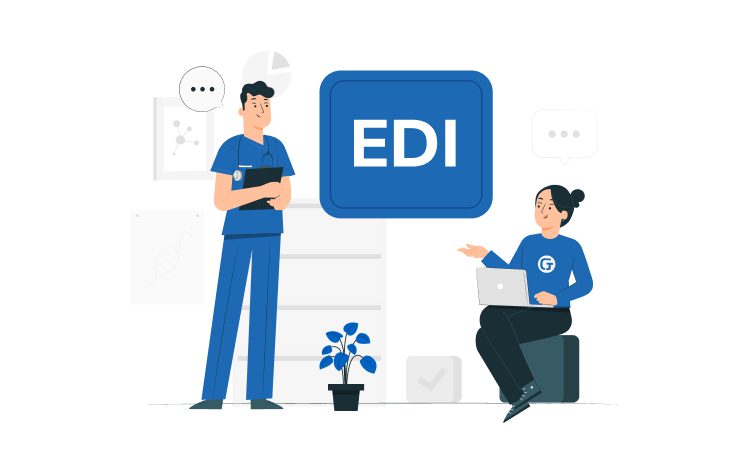
Team Extension vs Dedicated Development Team



Not so long ago, the only alternative to hiring in-house developers was to hand over your entire project to an outsourcing company. While there are numerous approaches to handling these situations, such as creating team extension or bringing in a dedicated development team, there is no right or wrong way to do business.
One may think that building a team from scratch is the best option. Someone else may have heard from a friend that hiring their own dedicated team saved them a ton of money. And others prefer to hand over the project to a trusted outsourcing company in order to let everyone focus on what they do best.
Content
Generally, the idea of a team extension is ideal on the surface. One can add the necessary number of developers to their in-house team and focus them on the specific project. When the project is done, everyone goes home. In reality, the team extension model combines the disadvantages of outsourcing and in-house development.
You are responsible for controlling and leading the entire process, as well as managing people that often won’t share the same values as your company. To them, your project is just one more project for the same salary and nothing to get excited about.
What is a dedicated project team? What’s great about having a dedicated software developers team is that you hire them and hand over the project that they will work on as if they were your in-house team. The company will assemble a dedicated software development team based on their skills and experience.
Another great thing is that the person managing the project will be working within the development team. You hire dedicated developers once, and they manage themselves from that point forward.
This way, you can completely replace your in-house development team or work together towards the same goal, sharing the responsibilities. The dedicated team model implies a deeper partnership than the team extension model.

Firstly, they collect the requirements for the project and any feedback for the preferred workflow. Then, the executor hires experienced specialists that possess the required skills. The process may take a few weeks before a capable team is assembled.
Next, the team needs to be implemented with the project. This includes assigning responsibilities, choosing communication channels, and managing tools.
In some cases, the first person that is introduced to the project is the team lead. The rest of the team joined gradually while the project was already underway.
The final step is to file reports on how much time the team should invest in the project. Thus, the service is billed on a monthly basis via a report detailing the status of objectives and deliverables.
In the team extension model, the client is accountable for leading and managing the project. There is always the risk that the client may fail to determine the specialists they need to deliver the project. Thus, the client might have to hire someone that specializes in executing projects.
On the contrary, the dedicated development team has an internal project manager that handles the project from beginning to end. The project manager makes sure the structure of roles is clear and that every developer knows their place within the team. This way, everyone on the team is motivated to get the job done fast and achieve the best results.
There is no way one can build a business without trust and mutual understanding. However, the relationship between the client and the development team in the team extension model usually isn’t so close. Quite often, such business relationships end when the last line of code is written.
Though, the dedicated development team model allows companies to build long-term and closer business relationships. There’s always time to better assess the team’s challenges and get to know the business in general. If there is no trust, it’s hard to avoid disappointment and discomfort in everyday life.
It may seem that both the team extension and dedicated development models are similar, but they’re not. For example, the outsourcing company takes full responsibility for creating and scaling a team of developers for each project, per the client’s needs and managing the entire development process. In contrast, the extension team takes only partial responsibility for a short period.
When outsourcing developers for a project, aka team extension, it is necessary to account for a general lack of knowledge about the company, products, and projects. Initially, these new team members probably won’t be as invested in the project as existing staff members.
However, when hiring a dedicated team, the close relationship you establish along the way helps to dive deep into the project and gain more expertise in the field.
The team extension model seems flexible, and one hires developers with the necessary set of skills and competencies no matter the location. In turn, the outsourcing company handles developers’ hire and employee training, software and hardware licenses, and many other aspects.
Also, the team’s overall motivation has proven to be much higher when compared to the team extension model.
First and foremost, the client and the contractor should be on the same page and ready to collaborate. The level of mutual trust needs to be higher when compared to the team extension model because of the amount of responsibility that the client hands over to the project manager. Meanwhile, the contractor must know that no one will be lured away to work for the client.
The dedicated development team can work together with the existing teams. However, it’s also important not to compete with the team but to work together towards the same goals.
Perhaps, it is reasonable to adjust your company’s values by accepting your dedicated team as an essential enhancement and support for the project as a whole.
Every software project is different. Ideally, outsourced developers will work exclusively on the client’s project, gaining knowledge and experience in that specific industry as time goes on.
Also, if the outsourced team works closely with the internal team, they essentially become part of the client’s company. This way, the client can create a team of developers around the project’s objectives.
Here at Glorium, we provide robust software for your business and will gladly help you hire a dedicated development team capable of satisfying your business goals.









| Cookie | Duration | Description |
|---|---|---|
| cookielawinfo-checkbox-analytics | 11 months | This cookie is set by GDPR Cookie Consent plugin. The cookie is used to store the user consent for the cookies in the category "Analytics". |
| cookielawinfo-checkbox-functional | 11 months | The cookie is set by GDPR cookie consent to record the user consent for the cookies in the category "Functional". |
| cookielawinfo-checkbox-necessary | 11 months | This cookie is set by GDPR Cookie Consent plugin. The cookies is used to store the user consent for the cookies in the category "Necessary". |
| cookielawinfo-checkbox-others | 11 months | This cookie is set by GDPR Cookie Consent plugin. The cookie is used to store the user consent for the cookies in the category "Other. |
| cookielawinfo-checkbox-performance | 11 months | This cookie is set by GDPR Cookie Consent plugin. The cookie is used to store the user consent for the cookies in the category "Performance". |
| viewed_cookie_policy | 11 months | The cookie is set by the GDPR Cookie Consent plugin and is used to store whether or not user has consented to the use of cookies. It does not store any personal data. |